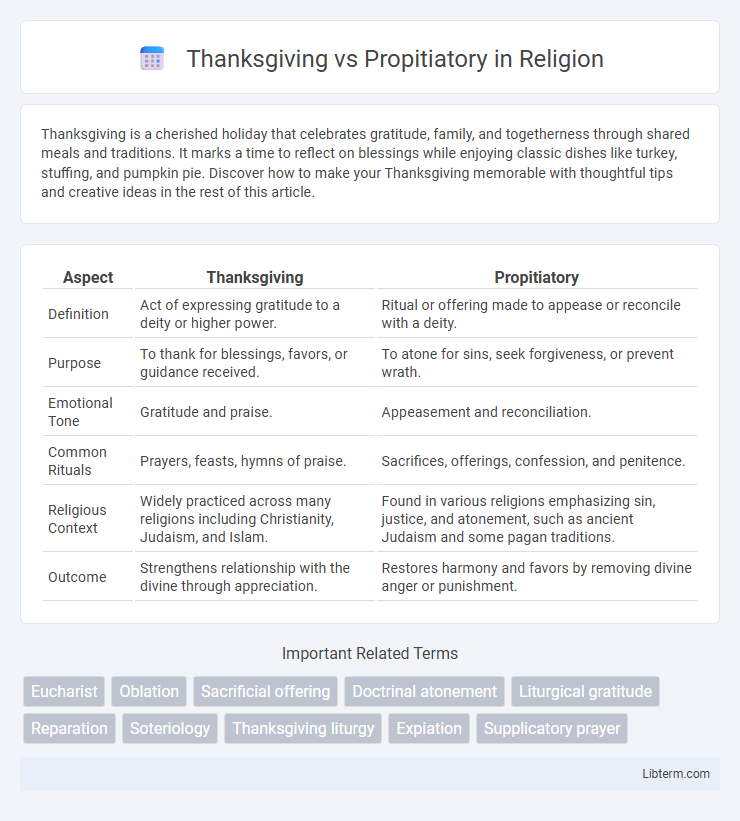Thanksgiving is a cherished holiday that celebrates gratitude, family, and togetherness through shared meals and traditions. It marks a time to reflect on blessings while enjoying classic dishes like turkey, stuffing, and pumpkin pie. Discover how to make your Thanksgiving memorable with thoughtful tips and creative ideas in the rest of this article.
Table of Comparison
| Aspect | Thanksgiving | Propitiatory |
|---|---|---|
| Definition | Act of expressing gratitude to a deity or higher power. | Ritual or offering made to appease or reconcile with a deity. |
| Purpose | To thank for blessings, favors, or guidance received. | To atone for sins, seek forgiveness, or prevent wrath. |
| Emotional Tone | Gratitude and praise. | Appeasement and reconciliation. |
| Common Rituals | Prayers, feasts, hymns of praise. | Sacrifices, offerings, confession, and penitence. |
| Religious Context | Widely practiced across many religions including Christianity, Judaism, and Islam. | Found in various religions emphasizing sin, justice, and atonement, such as ancient Judaism and some pagan traditions. |
| Outcome | Strengthens relationship with the divine through appreciation. | Restores harmony and favors by removing divine anger or punishment. |
Understanding Thanksgiving: A Definition
Thanksgiving is a religious or cultural expression of gratitude, often directed towards a deity for blessings received, such as harvest or general well-being. It involves acts of praise, offerings, and prayers to acknowledge and honor divine favor, distinguishing it from propitiatory rituals designed to appease or placate a deity. Understanding Thanksgiving as a definition highlights its emphasis on grateful acknowledgment rather than seeking to avert misfortune through sacrificial or appeasing means.
The Essence of Propitiatory Practices
Propitiatory practices center on appeasing deities or spirits to avert wrath and secure favor, often involving rituals, sacrifices, or offerings aimed at restoring harmony between humans and divine powers. This contrasts with Thanksgiving rituals, which primarily express gratitude and celebration for blessings already received, reflecting a positive acknowledgment rather than a corrective action. The essence of propitiation lies in its preventative nature, seeking to prevent misfortune by addressing divine displeasure proactively.
Historical Origins of Thanksgiving and Propitiatory Rites
Thanksgiving traces its historical origins to early colonial America, particularly the 1621 harvest feast shared by Pilgrims and Wampanoag Native Americans, symbolizing gratitude for bountiful crops and survival. Propitiatory rites, rooted in ancient religious practices, involve ceremonies or offerings intended to appease deities or supernatural forces to gain favor or avert wrath, commonly observed in various cultures worldwide. Whereas Thanksgiving centers on communal gratitude and celebration of blessings, propitiatory rites focus on ritualistic appeasement to ensure harmony and divine benevolence.
Key Differences Between Thanksgiving and Propitiatory
Thanksgiving is a joyful expression of gratitude typically celebrated with feasting and communal gatherings, emphasizing appreciation for blessings received. In contrast, propitiatory acts involve rituals or offerings intended to appease deities or spirits, often seeking forgiveness or favor. The key difference lies in Thanksgiving's focus on gratitude and celebration, while propitiatory practices center on reconciliation and appeasement.
Cultural Significance in Various Traditions
Thanksgiving is a culturally significant harvest festival primarily celebrated in North America, emphasizing gratitude, family gatherings, and communal feasting rooted in historical traditions such as the Pilgrims' 1621 harvest meal. Propitiatory rituals, found in diverse global cultures, involve offerings and ceremonies aimed at appeasing deities or spirits to ensure favor, protection, or the mitigation of misfortune, reflecting deep spiritual and religious significance. Both practices highlight communal values but differ in their focus: Thanksgiving centers on gratitude and celebration, while propitiation emphasizes reconciliation and divine favor.
Rituals and Customs: How Each Is Observed
Thanksgiving rituals typically involve a communal meal featuring turkey, stuffing, and pumpkin pie, symbolizing gratitude and shared abundance, often accompanied by expressions of thanks and cultural storytelling. Propitiatory customs center on rituals designed to appease deities or spirits, including offerings, sacrifices, or specific prayers intended to restore harmony or favor. While Thanksgiving emphasizes communal celebration and gratitude, propitiatory practices focus on spiritual appeasement and maintaining balance between humans and supernatural forces.
Psychological Impact: Gratitude vs Appeasement
Thanksgiving fosters a psychological impact centered on gratitude, promoting positive emotions, increased well-being, and stronger social bonds through acknowledging blessings. Propitiatory acts, aimed at appeasement, may trigger anxiety or guilt as individuals seek to alleviate perceived guilt or divine wrath. Gratitude encourages resilience and psychological health, whereas appeasement can reinforce negative emotional states linked to fear or obligation.
Thanksgiving in Religious Contexts
Thanksgiving in religious contexts often involves expressing gratitude to a deity for blessings and provisions, emphasizing acts of worship and communal prayer. Unlike propitiatory rituals that seek to appease divine wrath or atone for sins, Thanksgiving centers on acknowledging past favors with heartfelt praise and offerings. This practice is prominent across various faiths, including Christianity, where it highlights a spirit of gratitude and faith in divine benevolence.
Propitiatory Acts in Modern Society
Propitiatory acts in modern society often involve rituals or gestures intended to appease perceived negative forces or restore harmony, such as apologies, offerings, or restorative justice practices. Unlike Thanksgiving, which centers on expressing gratitude and celebrating abundance, propitiatory acts focus on reconciliation and mitigating harm within communities. These practices play crucial roles in social cohesion by addressing grievances and fostering forgiveness across diverse cultural contexts.
Which Practice Resonates Today? A Comparative Analysis
Thanksgiving remains a widely embraced practice centered on expressing gratitude for blessings, resonating deeply across diverse cultures and communities today. Propitiatory rituals, aimed at appeasing deities or spirits, are less common in contemporary mainstream society but persist in specific religious and cultural contexts. The enduring relevance of Thanksgiving highlights its universal appeal as a positive, collective celebration of appreciation and abundance.
Thanksgiving Infographic

 libterm.com
libterm.com